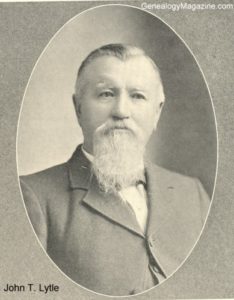 CAPTAIN JOHN T. LYTLE, a prominent and well known resident of Fort Worth, as for many years been identified in a successful and extensive manner with the cattle industry of Texas and is secretary of the Cattle-Raisers’ Association of Texas. Captain Lytle’s career is typical of his state in that it has been varied in its interesting events and has always been progressive toward broader success and power.
CAPTAIN JOHN T. LYTLE, a prominent and well known resident of Fort Worth, as for many years been identified in a successful and extensive manner with the cattle industry of Texas and is secretary of the Cattle-Raisers’ Association of Texas. Captain Lytle’s career is typical of his state in that it has been varied in its interesting events and has always been progressive toward broader success and power.
Born in Adams county, Pennsylvania, near the town of Gettysburg, a son of Francis and Margaret (Collins) Lytle,who, natives respectively of Maryland and Pennsylvania, both moved to Texas, where they died. John T. Lytle was a boy of fifteen when he moved to this state, being then just out of school. He went to old Bexar county, locating fifteen miles west of San Antonio. There he entered the employ of his uncle, William Lytle, a cattleman, who had come to Texas in 1836, the year of Independence, had first located in Washington county, whence in 1846 he moved to Bexar county, where he remained one of the foremost representatives of the cattle industry until his death.
From the strenuous life of a cattle ranch Mr. Lytle went to the yet more rigorous career of soldier. Enlisting in Bexar county in Woods’ regiment, the Thirty-second Cavalry of Texas, he spent three years in the Confederate cause. His regiment being attached to the Trans-Mississippi Department, he saw his service in Texas and Louisiana. He participated in the fighting during Banks’ Red river expedition, at the battles of Mansfield, Pleasant Hill and other engagements of that campaign. He received promotion to orderly sergeant of his regiment and served as such for two years.
After leaving the army Mr. Lytle resumed work as a cowboy on his uncle’s ranch. In 1868 he went back into the cattle business for himself in Frio county, where he lived until 1873, when he moved to Medina county, making his headquarters at Castroville, then the county seat. At this point he built up a large cattle business. Although he has always had a good ranch and cattle of his own, he made a specialty in those early days of handling large herds for market of the north and the range country in the north and northwest, such as Dakota and Montana. In those days all business of this kind was overland, the railroads not yet having penetrated the great cattle ranges, and the cattle were taken over the trails through Texas, the Indian Nation, Kansas and Nebraska. Not seldom, too, were these expeditions fraught with much danger, both from Indian raids and other perils, and captain Lytle can relate many adventures and interesting experiences connected with his cowboy life. His familiarity with the western range country enabled him, in 1876, to open and establish in general use what was known as the Griffin trail, from Fort Griffin, Texas, to Dodge City, Kansas, which was a much better route than the old trail, which was many miles to the east of the new one.
Thus from 1860 to 1887 Captain Lytle’s main business was driving herds over the trail and conducting his own ranch. When the I. & G. N. railroad was built south from San Antonio, Lytle station was established on his ranch, and this then became Captain Lytle’s home town and postoffice. He still retains ranching interests there, and of late years has invested in a large cattle ranch in Coahuila, Mexico.
Captain Lytle was elected secretary and manager of the Cattle-Raiser’s Association of Texas in 1903, and as the headquarters of the association are at Fort Worth he moved to this city on being chose to the position, and has since made this his home. The association represents the great cattle industry of Texas and is an organization of great service and usefulness to the cattlemen, numbering among its membership not only all the prominent cattlemen of Texas, but persons in other states who own cattle and ranches in this state. Before his election as secretary and manager Captain Lytle had been a member of the association for many years, and had served as a member of the executive committee, vice president, etc.
Captain Lytle married Miss Elizabeth Noonan, a sister of Judge Noonan, of San Antonio. His wife is now deceased, and there are two children, George N. and Miss Helen. Captain Lytle has fraternal affiliations with the Benevolent and Protective Order of Elks.
Source: B. B. Paddock, History and Biographical Record of North and West Texas (Chicago: Lewis Publishing Co., 1906), Vol. I, pp. 173-174.
